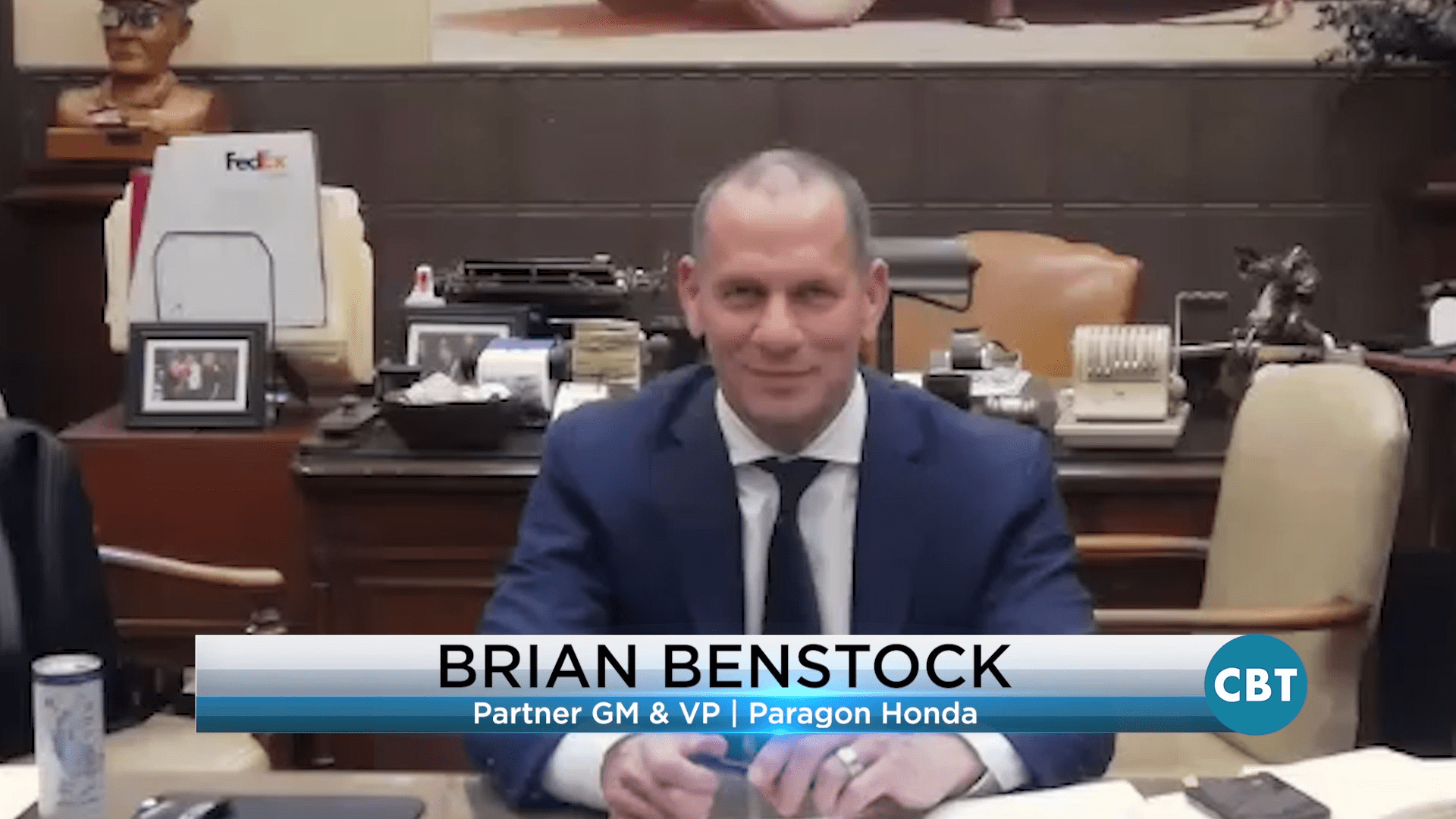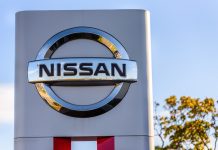With vehicle prices climbing higher and higher, taking measures to sustain profitability in the dealership is more important now than ever. And there are several ways to do it. Here to lend us his perspective as a high volume dealer is Brian Benstock Partner GM and VP at Paragon Honda.
Related: CADA’s Tim Jackson Weighs in On Rivian’s Bid to Sell Directly to Consumers
Jim Fitzpatrick: Hi everyone. Thanks very much for joining me on another edition of CBT News. Today we have a special guest with us, Mr. Brian Benstock. I know that you know this gentleman, he’s everywhere in the industry and he’s a frequent guest of ours here on CBT News. Thanks so much for joining us, Brian.
Brian Benstock: Jim, thanks for having me. Good to be here.
Jim Fitzpatrick: Sure. So I want to throw a lot at you. We’re going to try to do like just kind of a speed deal here, okay? And we’ll just throw some issues at you. Rivian this past week in Colorado, looks like they’re trying to get back in, or not back in, they’re trying to sell their cars much like Tesla directly to consumers. Should this be an area that dealers are concerned about?
Brian Benstock: Yeah, we should have been concerned about it 10 years ago, and we’ve been talking about this for a long time. You know, the Tesla was going to pierce the franchise system veil that’s been protecting us and hurting us. And once they do, that there were going to be a number of people that were jumping in through the hole that Tesla caused. And so it’s almost too late now.
Brian Benstock: I mean I don’t think we can rely on franchise laws to protect us any longer, because the toothpaste is already out of the tube. They’re not going to prevent Tesla from selling cars direct, they’re not going to prevent Rivian, the only question is now, how many more entrants are going to go through that loophole with electrification?
Brian Benstock: And, you know, every sale that is done outside of the franchise system, is a negative sale for our industry. And you know, I love the product, I think RJ’s done an amazing job at Rivian. I met the gentleman, he’s been at this for over 10 years and he looks like he’s 30 years old. And the concept’s incredibly beautiful. And I think that skate is going to be used by many different manufacturers, and I think this is going to be a difficulty for franchise automobile dealers.
Jim Fitzpatrick: So when you said the franchise system has both helped us and hurt us, what did you mean by the hurt?
Brian Benstock: Well it’s hurt us, right? Because what was designed to protect us, insulated us from what was going on in the rest of the world. Today’s consumer has the best buying experiences ever in the history of the world. The experiences that the average consumer has at his or her fingertips, has never been as good as it is today. And the industry did not need to change, because if you didn’t buy it from me, you bought it from him. If you didn’t buy from him, you bought it from her. But we are all the same in the eyes of the consumer.
Brian Benstock: And as things are changing in the retail environment, they were not changing in a dealership. I’ve got these pictures on the wall here from 1935 and 1936, and the industry hasn’t really changed since then, but everything else has. So that system of having a franchise system to protect the dealers has hurt us because we did need to evolve. And now we’re playing catch up to Amazon, we’re playing catch up to Tesla.
Brian Benstock: I imagine if when the OEMs give you a survey, right? Imagine if instead of surveying us compared to other dealers, imagine if they said, “Your purchase at Paragon, how would you compare that with your last purchase from Amazon?”
Brian Benstock: I don’t think we’d rate a 93-94% like we do now. I think the rating would be much lower. And I think if the OEMs started doing that, and the dealers started doing that, our customer experience would still be the same, but our perception of that experience would be changed. And therefore our customer experience would have to be improved, and dramatically.
Jim Fitzpatrick: And now, to your point, now that the toothpaste has left the tube, it all of a sudden gets a whole new generation of consumers asking, “Wait a minute, there’s franchise laws? You know, I didn’t know that I didn’t have the right to buy a vehicle directly from a manufacturer if they so choose to sell me a vehicle that way.”
Jim Fitzpatrick: So I think it just kind of is one of these situations that, man, you take that cover off and now everybody wants to know, what’s going on, why are there laws that protect car dealers, and who protects the consumer? And is the consumer better off if they can deal directly with the manufacturer? And how come that’s not a free flow there of enterprise, right?
Brian Benstock: The consumer’s going to do what is best for him or her. So our savior is going to be by providing that service, to be the best choice for the consumer. And then there’s no other way around it. You can’t protect us from what’s going on outside of our industry. Let the free market prevail, and then the dealers have to give you best alternative and the best solution for today’s automotive customer.
Jim Fitzpatrick: In your book, where does that begin? Where do we start to go? I know we should have started to go down this road already, but if for dealers of Elysian, where does a dealer start? I mean I know we’ve got to give a better customer experience, but if you back into that, where does it really begin? Showroom floor? In the C-suite?
Brian Benstock: Alignment with the OEM. And that may be controversial to some people, but, you know, the benefit is there’s only one Apple. There’s not multiple Apple experiences, right? They have an online experience and an in-store experience, but the Apple experience is the Apple experience. Starbucks, it’s a franchise. There’s a Starbucks experience, right? And so the cup of coffee you’re going to have out in LA or you’re in Atlanta, it’s going to be roughly the same as a cup of coffee I’m going to have here.
Brian Benstock: Very little variance. That’s not the case, right, if you’re a Honda dealership in Atlanta. That may be a very different experience than what you get to the Honda dealership in our dealership. And the services provided, vary wildly.
Brian Benstock: I think that we, having some better alignment with the OEM, can then unify and provide a unified and consistent experience for the customer cross-departmentally. And I think that’s what we were looking for, is to have that Honda experience really spectacular.
Brian Benstock: And, you know, a lot of independent dealers, and we’re all independent, like I said, “No, it should be done my way.” Well, you know, the consumer is going to have the final vote. So I think the more we can have alignment, the better off we can be at serving the customers. And then the non-franchise operators like Tesla, lose their edge.
Jim Fitzpatrick: Let’s talk about Carvana because I think it dovetails beautifully into this. I mean Carvana has now shown us that vehicles actually can be sold via an app and with a liberal return policy, and that, you know, some 180,000 people decided to purchase a vehicle just that way last year. We don’t know… You know, I think they’re shooting for like 400,000 this year. Those deals are coming right out of the used car departments of all of the franchise dealers in those markets, is it not?
Brian Benstock: It is.
Jim Fitzpatrick: It is.
Brian Benstock: You know, I love what they’ve done. I’ve met Mr. Garcia Sr, and even though they’re competitors, you know, I respect him, my hats off to the job that they’ve done. You know, I think the business model is not an easy one for them. I’ve read some reports where they’re, you know, it’s not all roses. They’re losing some money and significant money, and so they’ve got some challenges.
Brian Benstock: Again, this is a part of the business we forfeited, and we don’t have to forfeit it. We’ve been doing pickup and delivery for many years at Paragon Direct. I think, again, imagine if Honda dealers, if Honda had that offering, pickup and deliveries for sales, pickup and delivery for service, Carvana goes away or they become less of a concern. These entrepreneurs are going to fill the gaps that the dealers have not been filling, and they’re going to do it in a way that we don’t think of doing, right?
Brian Benstock: Remember when the banks used to be open from nine to three, that was the only time they were open. And then TD Bank comes in and they’re open until eight o’clock at night, and then the whole game changed. And now I can’t even tell you the last time I went into a bank. It’s not necessary, I do everything online, almost everything online. Well, the same thing’s going to happen to our business. Someone’s going to come in and say, “Stop this nine to three nonsense, here’s where you need to be available for your customers.”
Brian Benstock: And, you know, we’ve taken some of the first steps, having Paragon open 24 hours for service, because your car doesn’t make an appointment when it breaks down. People’s lifestyles are very different, and we need to be more efficient with our square footage, right? We’re paying rent 24 hours a day, so you might as well have that real estate generating money 24 hours a day. And I understand this is not appropriate in all markets, but for us, we could expand the amount of the footprint and then maybe not be open 24 hours a day. That comes at an incredible expense. So we think, let’s utilize all the hours that we have, and let’s look at the customer first.
Jim Fitzpatrick: But in many markets, and I don’t know about 24 hours a day, but it could certainly be extended service hours, on Saturdays full day, on Sunday, either full day or until three o’clock, four o’clock.
Brian Benstock: Don’t we have all the excuses? Don’t we have all of the excuses. Why have a union shop? Well, our shop is a union shop, and by opening up extended hours, that means more membership and more union dues and fees being paid. So it works for the union as well as for us.
Brian Benstock: Whether you have a shop or not, they understand the world is changing. You know, we’re blasting… The Teamsters union that we have is great and they’re flexible with us, and that’s not usually something that’s associated with unions. But, you know, if you make a good proposition, business proposition to the union, I think they’re more than flexible with you and will allow you to have the ability to expand your business, which, for us, was very important.
Jim Fitzpatrick: Let’s switch gears a little bit. The relationship between gross profit, every dealer complains about margin compression, rightfully so. There’s not a lot of money being made on the front end of these new vehicles that we have coming into our showrooms. However, what’s the relationship between front end gross profit and sales training? Because the sales training still seems to be something that dealers haven’t gotten their hands around to say, “We got to own this, and we got to do it on a continuous basis, and we got to really, you know, fix this problem.”
Brian Benstock: I like being on your show because you’re smart and you get it. I was just thinking as you were talking about margin compression, how much of that margin compression is due to young ladies and young men on the showroom floor not being properly trained? I mean the product has never been better. What do you pay for an iPhone? You pay full list each and every time, right? Because their sales teams are very well trained. Ours are not, there’s not a single customer going into the marketplace today that expects to buy a Honda Accord or a Honda CRV and for the dealer to lose money, yet it happens every single day. Why? It’s training. It’s education. The price of a car has not gone up, its value’s gone up, right? A gallon of milk 30 years ago was, well, I don’t know, a dollar a gallon? And a gallon of milk today is $4-$5 a gallon.
Brian Benstock: How much of that increase was inflation? 100% of the increase in the cost was inflation. Our car has got better, our car’s got safer, our car’s got more technology, the car’s more fuel efficient. A large portion of the increase in the price of an automobile is value to the consumer. We’re not telling that story. And if you’re not telling that story, the only trick you have, and your focus to drop your price instead of showing the customer the value. They’re getting more for their dollar than they ever did before.
Jim Fitzpatrick: That’s right.
Brian Benstock: So the Honda Accord in 1982, the Honda Accord came with 68 horsepower, it had no airbags, it had a three speed manual transmission, it had 13 inch wheels and tires, it had arm strong roll up windows. It had an AM normal stereo. It had disk brakes in the front, not cross ventilated, drum brakes in the rear. And if you say that car was 12,000, and today’s car is 25,000, if we just added the extra, what are the airbags? $2,500 a shot. What’s the stereo system in the car? Another $2,500.
Jim Fitzpatrick: The story’s got to be told.
Brian Benstock: I mean, the car’s going to be $60,000, but it’s not. We’ve done an incredible job at improving manufacturing and keeping the costs down, and we don’t tell the story. Does that mean that the margin compression is false? It doesn’t, but we, by having a lack of training, exacerbate that. I think the average sales person… When was the last time we had a recession? 2008, right? And so that’s 12 years ago.
Jim Fitzpatrick: Yeah.
Brian Benstock: Take 12 years off the average age of the person on my showroom floor, and they were in elementary school or high school.
Jim Fitzpatrick: Good point.
Brian Benstock: They have not been through series of ups and downs in the market. They haven’t experienced what it is. They’re waiting just for the dealer to buy more ups for them today. That’s not training. And so we are focusing on customer experience and training. There are less customers coming in now than ever before. That’s not a bad thing. It’s because most of their shopping, they’re able to take care of online before they come into us. So the closing ratios should be, and they are much higher.
Brian Benstock: And so you really, if you’ve got one opportunity, you need to make sure that you’re prepared, that you’re trained, and that customer experience is memorable.
Jim Fitzpatrick: What does a training schedule look like at Paragon today? If I’m a sales person on your showroom floor, how often am I in training?
Brian Benstock: Every day.
Jim Fitzpatrick: Every day?
Brian Benstock: How often do you daily train? Every day. And, you know, it will circle back again to some of the same subgroup. You know, repetition’s a marketer skill, but the training goes on every day. Show them traffic training, using the technology training.
Brian Benstock: Jim, the proof of the pudding if we’re not training the salespeople is, when three were 20,000 dealers in the country, we employed about a million people in our industry. Today, there are 16,000 dealers and we employee 1.1. There’s a disconnect there. We’re employing more people. I thought technology was supposed to enable us to have less people and to do more, and I’m not talking about getting rid of people, that’s not it. But efficiencies in the marketplace are a must. Look at a Tesla store, they have two people in there, or three people in the store, and there are no managers.
Brian Benstock: There are sales people that manage the transaction. Those efficiencies, we have to bring into our dealership.
Jim Fitzpatrick: Though, to your point, we can actually learn a lot in this industry from the disruptors, from the Tesla, the Vroom’s out there, from probably even Rivian, when they get landed, as well as the Carvana’s out there, and for that matter, the CarMax’s. I mean these are all companies that are not traditionally automotive retailers that have come into the marketplace in a very, very big way. Look at CarMax, still the number one used car retailer in the country by far, and they sell their cars at zero discount. So there’s a lot we could learn from these people, right?
Brian Benstock: Well again, by providing process organization and training, you’re able to charge more money. They’re offering a Honda Accord, I can put my car up against your car and sell it for less money. Yeah, they’ve got a franchise system, an organized way of getting that information out to the consumer that allows them to charge more.
Brian Benstock: Amazon is not the low cost provider of anything. You can meet their price at your local store if you take the time to shop, but they’re providing a great customer experience.
Jim Fitzpatrick: It’s the process.
Brian Benstock: So the answer is, improve the customer experience.
Jim Fitzpatrick: Today, where does Paragon stand with regard to the percentage of deliveries that are completely online and are digital, or considered digital retailing?
Brian Benstock: It’s improving every day. I don’t give out specific numbers, but let’s suffice to say that the industry average is about 1%, and we’re well above 1%. Keep in mind there are a lot of brokers that are now getting into the car business. That’s another example of a blind spot for the dealers, right? They’re picking up the customer’s car and delivering it to their house, and why the heck don’t we do this? It’s the same thing.
Brian Benstock: We can’t sit here and let our service business, 80% of it go to the independents, and let this business go. It’s because we’ve not been flexible to change. And so we’re trying to be as agile as the marketplace is, and move with the market and provide the services and hopefully a better alternative to the customers.
Jim Fitzpatrick: Do you think as an industry we’ve gone too far into the digital world?
Brian Benstock: No, I think we’ve only begun. You know, you’re right now programmatic advertising allows a Google to update your ads 40,000 times a day. It is still a very small percentage of a dealer’s budgets going to Google, which is mind boggling. It just shows that there’s so much waste out there.
Brian Benstock: You know, in fact, if you waste an advertising dollar today, it’s a choice. You have a choice to have attribution on your advertising and what you’re not. And if you don’t have attribution on your advertising budget, you’ve got waste. And there’s no excuse for it today. So have we gone far enough in using technology? No. I think we’ve done some good things and we’ve got a computer on every desk out there, an Apple computer, and make it real easy for people. But the technology’s got to make it easy for us to do commerce, right, for the consumer and for the dealership.
Jim Fitzpatrick: I spoke to a dealer recently and we were having a conversation about the relevancy of today’s car salesperson. And he said that today’s salesperson just isn’t as relevant as they were 25 or 30 years ago, in that the digital customer comes in virtually to our BDC center. You know, the BDC center takes the vast majority of the weight off, lands them on the car, sends all the information, and so on. And when that customer comes in the door, they’re greeted by a greeter, then they’re sent to a specific sales manager, which the sales manager introduces him to a sales person. But, you know, in his estimation, 60 or 75% of the process and the deal was already done. They knew the car, they knew the finance, they knew the rate, they knew their trade allowance, and the salesperson was just there to kind of show him the car. Do you see our industry going in that direction?
Brian Benstock: I don’t. I don’t, I think the sales person’s responsibility’s never been greater. Like I said, the closing ratio has to be much higher, and the customer is now charged with the experience, right? I mean the sales person today is charged with a customer experience. So there’s never been more pressure on a salesperson today to provide that experience. The expectation of today’s customer is that you know everything on that car, and the car has never been more complicated.
Brian Benstock: So, you know, I think if I adapted that approach, I think we lose a lot of margin, because all the values and knowing– to be able to explain it. Let’s face it, you go to an Apple store and there’s a pimple faced kid showing you an iPhone, and he or she knows everything about it. Not that there’s anything wrong with pimple face kids –.
Jim Fitzpatrick: I was going to say. Why you got to hurt on the pimple face kids?
Brian Benstock: But they’re very young kids, right? They’re young kids-
Jim Fitzpatrick: I know what you mean.
Brian Benstock: –an earring, a nose ring, an eye ring, and they’re completely competent.
Jim Fitzpatrick: I know.
Brian Benstock: They’re competent. And so all the prejudices I may have against earrings and nose rings and everything else, go right out the door because I want to deal with a professional. And the Apple store provides relaxed, trained professionals, irrespective of their age, irrespective of their hairstyle, and everything else. And I think there’s a real lesson there for us that, that competence is super important.
Jim Fitzpatrick: Well, I’ve been to your dealership and spent a little time and I will tell you, there’s no more professional looking group of individuals when you walk into that showroom in the industry than at Paragon Honda. Very, very impressed. I mean their attitude, they’re dressed to the nines, they’re in suits, they’re in white shirts and conservative ties. And it blew me away.
Brian Benstock: Look at how you dress, look at how I dress, and we’re professionals and we want to get paid like professionals. We want to act and be professionals, and they should want the same thing. And again, I know that there’s a lot of different opinions on that. My friends at Google backpacks, jeans, t-shirt and that works for them.
Jim Fitzpatrick: Sure.
Brian Benstock: But, you know, I’m want those sales people to make the right impression initially, and then throughout the sales process. And hopefully they do.
Jim Fitzpatrick: Thank you for all the time. Before I let you go, if you’re willing to here, you spoke recently at the Fixed Ops Roundtable. Talk to us a little bit about what you talked about with regard to Fixed Ops, because you are one of the leaders, as well, in that area, some of the things that you’re doing at Paragon.
Brian Benstock: Well, you know, I was able to give a fresh look at Fixed Ops a couple of years ago when it was still a changing focus, because I was such a novice at it. And I was able to look at, ” Hey what’s going on elsewhere?” And when we looked, it’s a $500 billion industry that the dealerships today are getting only 20% of it. So the customers are opting out of the dealer experience 80% of the time. And we started to look at, why is that? You know, we asked the service managers and they said, “Well, it’s because it’s cheaper and less expensive,” and it’s really not that. It’s convenience and proximity, and again, some of the big box service providers, the Jiffy Lube’s, the Pep Boys organized things better than we did. They had better processes than we did, better scheduling than we did, more convenient than we did, better locations than we did.
Brian Benstock: And it’s a wonder that they took our business. And we set out to see, what can we do to take that business back and we went after pickup and delivery, we think that was a great opportunity for us. And that portion of our business has grown by 440% over the past three years.
Jim Fitzpatrick: Oh my God.
Brian Benstock: 440%. We went from 600 pickups a month to 1,900, to now over 3,000 pickups a month.
Jim Fitzpatrick: That’s incredible.
Brian Benstock: Yeah, we’re pretty proud of that. And we’re not taking the business away from other franchise dealers. I don’t want to do that. I love my fellow franchise dealers, but I do want to take that business back from the independents, that was ours in the first place. We should have never given it up, so we’re giving those guys a hard time. Hey, I’ll tell you something else. You know people, the way they search today, when they search for an oil change, they don’t say, ” Honda oil change near me,” or “Paragon oil change.” They search for, “Oil change near me.”
Brian Benstock: When we searched, oil change near me, not a single dealer came up, including us, not a single dealer. So we’re missing out because we think by having the big Honda sign or Acura sign outside, customers know we’re here. But when you’re not on the phone, you’re not or on the internet, the customers aren’t going to reach you.
Brian Benstock: And we say, “If you want to win in the showroom or in this service department, you’ve got to win online. And if you’re going to win online, you’ve got to be where the customers are searching.”
Jim Fitzpatrick: That is so true. Congratulations on all your success in Fixed Ops. I know that a number of people in the industry are watching you closely and have been because of some of the innovative things that you’ve done there at Paragon. So congratulations on the success of all of that.
Brian Benstock: Jim, we’re making plenty of mistakes there too, you know, and that’s how you learn.
Jim Fitzpatrick: That’s part of it.
Brian Benstock: It really is, the first year or so, you know, we put a tremendous investment in getting the kinks out of the system, but I can tell you, we’re pretty pleased with what’s happening–.
Jim Fitzpatrick: Yeah. Well, Brian Benstock, partner, GM, VP at Paragon Honda, the one and only Paragon Honda, and the one and only Brian Benstock. Man, you’re out there fighting the good fight for dealers every day on their behalf. And I don’t know what you’re into it for, I guess just to make the industry better, and I commend you for that.
Brian Benstock: It’s in my intelligent, self-interest, because if the industry suffers, you know, we’re all in the same boat. And so if the industry is taken over by some of the outsiders, the interlopers that are looking to take our business, then we’re all in trouble. So it really is a unifying message of, lets the dealers and the OEMs get together. Let’s get the Honda dealers and the Honda manufacturer together, and then let’s come up with the best processes to solve for the customer’s needs. And the trouble ends, whatever those needs are, whether that’s electrification, whether that’s autonomous cars, whether that’s subscription, all of those things, connected vehicles, all of those opportunities for us, if we’re unified, I think we have a much better shot of finding those forces that are coming in trying to take over industry.
Jim Fitzpatrick: I agree. We need more Brian Benstock’s out there in the auto industry. There’s a lot of dealers that sit on the sidelines and watch guys like you and people at the NADA, and some of the associations around the country do the heavy lifting. But, you know, this needs the 16-17,000 dealers to work together and get up off their hands.
Brian Benstock: Sure.
Jim Fitzpatrick: Brian Benstock. Thanks so much for joining us on CBT.
Brian Benstock: Jim, thank you.
Jim Fitzpatrick: Thanks.
CBT Automotive Network, the number one most watched network in retail automotive. This has been a JBF Business Media production.









